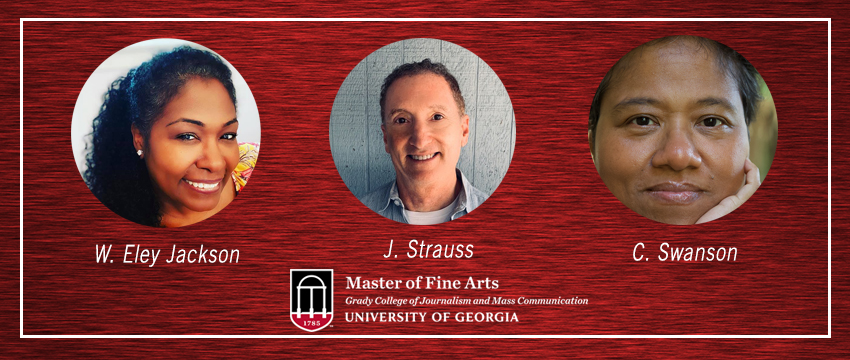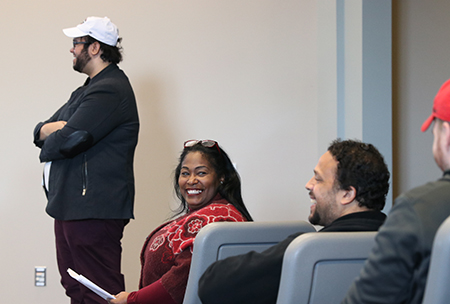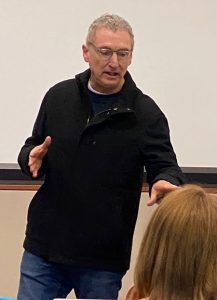Reaching goals through the MFA program in Screenwriting

Reaching goals through the MFA program in Screenwriting
This is the second of a two-part series highlighting a few successes earned by students, faculty and alumni of the low-residency MFA program in Narrative Media Writing. This installment illustrates a sampling of the paths taken by those in the Screenwriting track. Read about successes in the Narrative Nonfiction program here.
Success as a screenwriter often comes in the form of a produced movie or television show, or in teaching the next generation how to find their voices and write their own screenplays.
The MFA program in Narrative Media Program, developed by directors Valerie Boyd (Narrative Nonfiction) and Nate Kohn (Screenwriting), affords writers the opportunity to learn in a low-residency format. Students have flexible schedules so they can study without having to give up their jobs or uproot their lives while pursuing a degree. The program features a week on campus in Athens at the beginning of each semester, followed by a distanced semester of individualized instruction by an impressive faculty of industry mentors.
Following are some recent success stories from MFA alumni and faculty in the Screenwriting track.
Wendy Eley Jackson (MFA ’19)
When Wendy Eley Jackson graduated from the MFA screenwriting program, her accomplishment was a goal deferred but one that was worth the wait.
Jackson had dreamed for several years about earning her MFA but waited for her two children to finish their undergraduate degrees first.
“When UGA created this program, I seized the opportunity to improve my storytelling skills and become a better writer,” Jackson said. “Producing has always come easy for me but I wanted to be a masterful writer as well. UGA gave me that.”
The one-on-one contact with MFA faculty and mentors and the small class size are the qualities Jackson appreciated the most about the program.

“The people make the program so special,” Jackson said. “The close proximity to major writers, producers and agents made this the perfect program for me.”
Jackson is the founder and CEO of Auburn Avenue Films, a production company specializing in projects that are diverse and encourage positive change. Most recently, she was executive producer for “Welcome to Pine Lake,” the highest rated documentary in CBS All Access history.
She also teaches classes in crew production, screenwriting and writing for television at the University of California Santa Barbara.
Jackson credits the MFA screenwriting program for honing her writing skills, focusing on building story and developing character.
“As a filmmaker, I understood structure and the basics, but my mentors helped me elevate my understanding and execution for creating impactful stories,” Jackson said. “It’s a master class, not a basic class.”
John Strauss (MFA ’20; Screenwriting Mentor)
With Los Angeles as his home base, John Strauss has spent nearly 30 years as a screenwriter and producer involved in such popular hits as “There’s Something About Mary,” “Santa Clause II” and the Peabody Award-winning series, “David Makes Man.” He also teaches part-time at Loyola Marymount University in Los Angeles. The idea of commuting regularly to the semi-annual residencies in Athens from L.A. was initially daunting, but the trips proved to be something he really looked forward to – writing retreats that inspired new creative work on his part.

“The flexibility of the program and the fact that you don’t have to move to earn your degree makes it a great setup for someone pursuing a career who can’t just quit their job,” Strauss said.
Strauss now serves as a faculty mentor in the program he graduated from, allowing him to remain an important part of UGA’s growing community of writers while giving back to the program where he earned his MFA.
“I loved the pre-COVID ritual of coming to Athens,” Strauss said. “Athens has such a great energy and being around fellow students and the guest lecturers that they bring in…it was frankly fun and fulfilling.”
Strauss pursued his MFA because he discovered how much he enjoyed teaching and he needed a terminal degree to continue. Despite his years in the industry, Strauss knows there are always things to learn.
“I really believe that one can never stop learning. I am not saying that to be pithy, but between various mentors and guests and fellow students, I learned all kinds of things for a really fresh approach. And I continue to learn as a teacher.”
The past year has been busy for Strauss despite COVID. He is working on a new pilot on Hulu with Viola Davis’s production company, and he has another project with Warner Brothers and Harpo adapting a story by Tarell Alvin McCraney.
For someone who has found success in the industry, Strauss appreciates the value of the UGA MFA program.
“My advice is that if you want access to an A-level instruction program with mentors who are working in the business and you still want to continue your job, this is a perfect program to enroll in,” Strauss concludes. “It is absolutely commensurate with any film program I can think of in terms of mentors and their resumes.”
Christine Swanson (Screenwriting Mentor)
Despite her successful career as a filmmaker and storyteller, it is Christine Swanson’s job mentoring students in the MFA Screenwriting track that keeps her mind fresh and open to new ideas.

“Mentoring keeps me on my toes and aware of my own limitations and forces me to figure out what those holes are and fill them,” Swanson said. “It’s about personal advancement and growth.”
When she is not mentoring, Swanson is writing, directing and producing. Swanson’s latest project, “The Clark Sisters: The First Ladies of Gospel,” aired on Lifetime and earned the 2020 Best TV Movie award from the African American Film Critics Association. The movie was nominated for a Critics Choice Award for Best Movie Made for Television. Other credits include “Love Under New Management: The Miki Howard Story” for TV One and episodes of the television shows “Chicago PD” and “FBI.”
A big attraction of the MFA program is that doesn’t require a lot of time in a different city to complete the degree.
“Students have one-on-one access with professors and mentors throughout the year,” Swanson said. “As faculty, we are given ample opportunity to interact with our students, and students are able to build their networks and always be in the position to seek mentorship and advice from any of us.”
She advises that students interested in the program should have some knowledge of the screenwriting process.
“Students hit the ground running,” she said. “You are not going to be babysat. You need to be motivated. You need to go in knowing what you want from professors and the program to be successful.”
This motivation is key, according to Swanson, because although storytelling talent is innate, foundational knowledge is necessary to become a successful professional writer.
“I try to teach students sound screenplay structure and then push them to find their own voices within the structure and to come up with something unique and viable,” Swanson said. “Some writers are more naturally talented than others, but I also say ‘hard work beats talent when talent doesn’t work hard.’”
For more information, visit the MFA Narrative Media Writing program website.